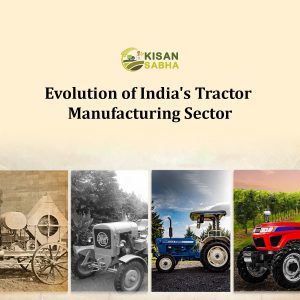Farmers Producers Organizations (FPOs) are a legalized form of farmer-owned institutions, which consists of farmer members with common interests and concerns. It is an entity formed by primary producers, like farmers, milk producers, fishermen, weavers, rural artisans, craftsmen, etc. It can be established in the form of Producer Company, a Cooperative Society or any other legal form which provides systems for sharing of profits/benefits among the members.
These institutions are registered under company’s act and are governed by a set of bye-laws and rules. The structure of these FPCs starts with mobilizing farmers into groups of between 15-20 members at the village level (called Farmer Interest Groups or FIGs) and building up their associations as Farmer Producer Organizations (FPOs), where members can go up to 1,000 in some cases. FPOs are groups of rural producers coming together on the principle of membership, to pursue specific common interests to harness technical and economic benefit.
FPOs were evolved as new generation producer-led organization, to help them receive benefits of aggregation and economies of scale. Organized systems and institutions are required to help small producers aggregate their demand and supply and receive competitive prices for their input materials and commodities produced, to increase their benefits. The commodity value chain has various enablers ad supporters, all these share profit margins and finally reduces the overall profits of the producer itself. These intermediaries are inseparable part of value chain, who work very often in a non-transparent way to receive their own benefits. All this is possible due to absence of systems and institutions.
The main objective of an FPO is to ensure better income for the producers through an organized system of their own. Small producers do not have the large marketable surplus individually (both inputs and produce) to get the benefit of economies of scale. These farmer members own agricultural land in the range of 0.5 to 1 hectare, hence have little to no bargaining power for their input and output supplies.
Less than 4% of these farmers possess Kisan Credit Card. According to the latest published reports by NABARD, the number of FPOs in India are little more than 5,000. This number is quite large if seen as farmer-owned institutions and in terms of outreach of any vulnerable section of the rural population. Of these around 3200 FPOs are registered as Producer Companies and the remaining as Cooperatives/Societies etc. Majority of the PCs are very new and have a shareholder membership base in the range of 100 to 1000 farmers.
The farmer producer companies do require technical and managerial expertise to carry on their requisite work, including forward-backwards linkages, best agriculture practices, seed production, value addition, branding etc. to make their business operation sustainable and more profitable for all shareholders. An inclusive yet affable ecosystem is required for any producer organizations to develop and nurture, because they have to deal with issues starting from farm till far-away markets. This ecosystem must comprise of various services like emergency credit, consumer credit, production credit, retail services of inputs for agriculture, storage, transportation and other agricultural production services required by the small and marginal farmers. This ecosystem can be strengthened with various types of services made available for farmer members at the right time and at affordable price. These services provided by POs are capable of diverting surplus produce from the local trader to the producer organization and can help maximize the profit margins of the company. Additionally, the producer organizations can take up other services related to facilitating linkage with the banks and line departments for ensuring the infrastructure access for the business.
Farmer producer companies can be strengthened more through various policy and structural reforms, including technology support, financial support through customized services and loan products and marketing support in various markets available (retail, spot and futures).
The various government-supported agencies and NABARD has provided initial funds to build capacities, technical assistance and develop innovative financial systems for sustainability of FPCs. NABARD created its own subsidiary (NABKISAN Finance Ltd.) for meeting the credit requirements of FPOs by adopting a flexible approach based on life cycle needs, while it continues to provide promotional support towards capacity building, market linkages and other incubation services to FPOs out of grant fund.
There are various schemes launched by the Government of India for the support of FPOs; these include:
- Equity Grant Fund Scheme
- Credit Guarantee Fund Scheme
- Scheme for Creation of Backward and Forward Linkages
- National Rural Livelihoods Mission (NLRM)
The union budget 2018-19 was much focused on promoting and strengthening Farmer Producer Organizations. These measures will help promote FPOs towards prosperous and sustainable agriculture sector with increased agriculture productivity through efficient, cost-effective and sustainable resource utilization. Some of the examples were launch of “Operations Green” for onion, potato and tomato crops with an allocation of Rs. 500 crores. The initiative aims to address price fluctuation in vegetables for the benefit of farmers and consumers. Another step taken by the Government was 100% tax deduction for FPOs with an annual turnover of up to Rs. 100 crores, this step is expected to encourage enabling an environment for aggregation of farmers into FPOs.
Some of the challenges faced by these new generation institutions are linked with its basic design, i.e. farmers’ inefficiency to act as managers or CEOs of the organization, understanding of various resource optimization techniques, update with best agri-practices and representation of farmers as a group in organized market. This calls for a strong handholding and capacity building initiatives, which can be governed by local authorities but delivered through local institutional development civil society organizations or other capable institutions working with farmers. Farmers do face challenges related to customized and affordable financial services, which currently are not provided as per their future cash flows. They also face a problem in selecting the CEO, whether from inside or outside there is always a risk.
The FPOs have come a long way in past some years, success and failure cases shows that these institutions require some policy changes to attain sustainability and reap optimal benefits for its shareholder. Some of the policy reforms which can be thought of are mentioned below:
- Allowing private equity, angel investor and venture capital support to FPOs as the lines of support for start-ups can be introduced.
- Amendments in Food Grain Procurement policy is required to allow procurement of produce directly from FPOs under Minimum Support Price scheme.
- Specified funds can be created or diverted from Government to build infrastructure at FPO level, including facilities for grading, sorting, packing, branding, storage, transportation and marketing.
- Proper changes can be brought in under Equity Grant & Credit Guarantee Fund schemes to include a large number of FPOs having less than 500 farmer members.
- Liberal statutory compliances may be provided for FPOs during the initial 10 years, to help them stabilize (operationally and legally) in business environment.
- Suitable amendments in the APMC Act can be brought to treat the country as a single, unified market for agri-produce with no restrictions on commodity movement as also to enable FPOs market their produce directly to the consumers/ bulk-buyers, without payment of Mandi Fee.
- Convergence of delivering various farmer and agriculture related schemes through FPOs.
- A single window can be introduced for issuance of all licenses to FPOs, to ease the process of doing business.
- Awareness and capacity building of farmers and position holders in FPCs should be done on regular interval to help them understand the real benefit of institution.
FIG – Farmer Interest Groups
FPC – Farmer Producer Company
FPO – Farmer Producer Organization
NABARD – National Bank for Agriculture and Rural Development
PO – Producer Organization
SFAC – Small Farmers’ Agri-Business Consortium
source: Timesofindia
Link: https://timesofindia.indiatimes.com/blogs/agyeya/farmer-producer-companies-benefits-are-still-away/




